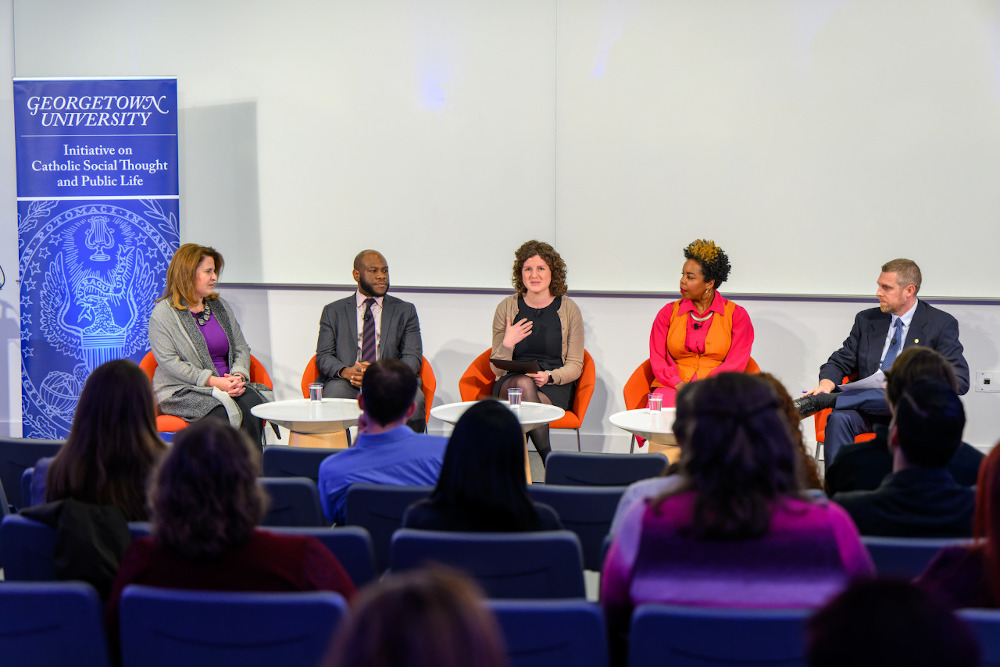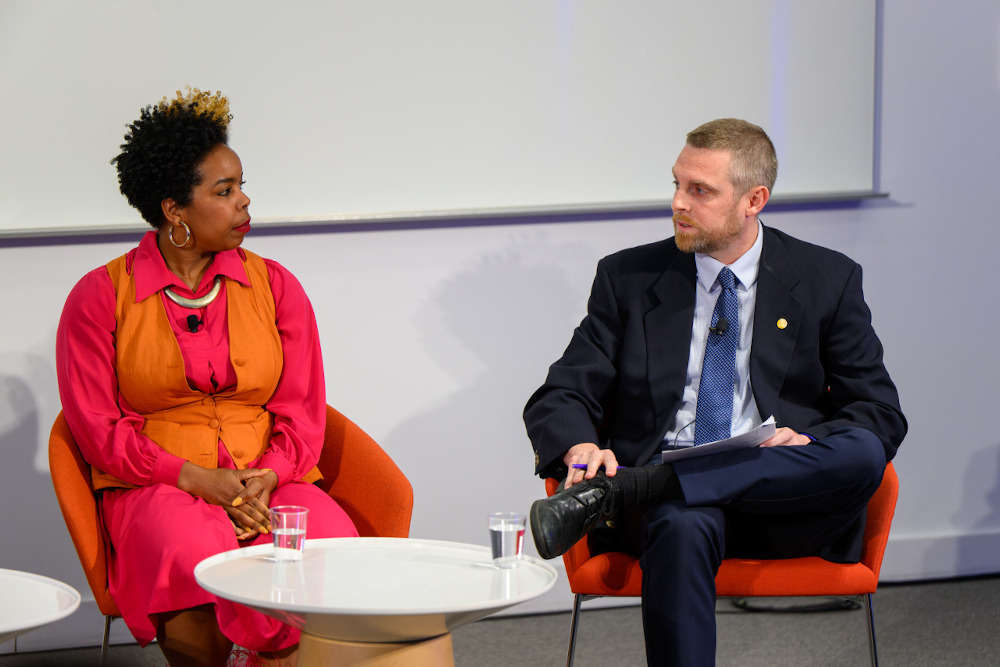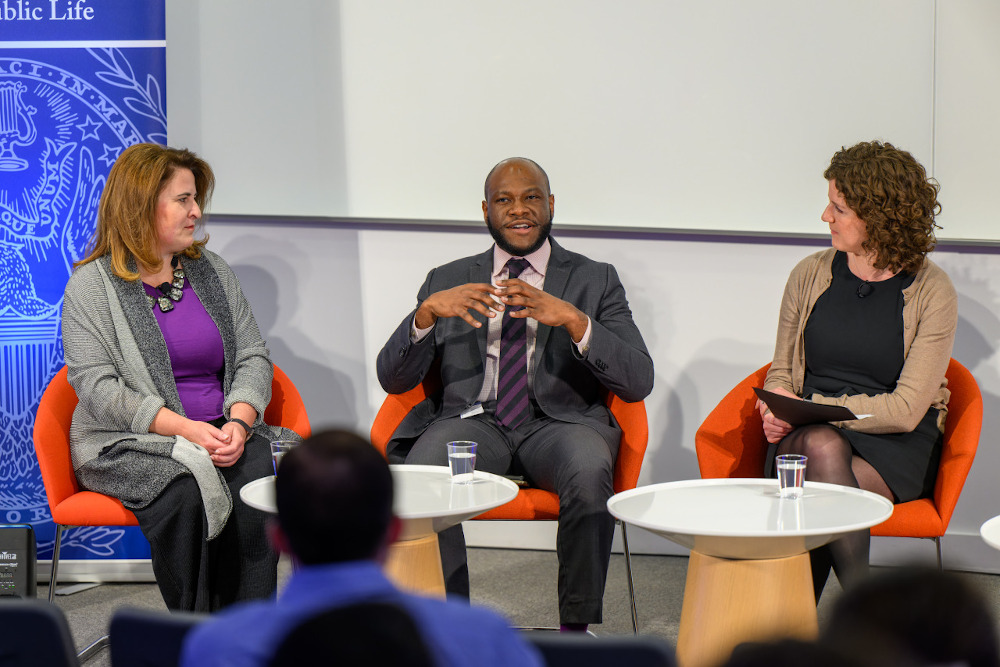
From left: Dawn Carpenter, founding director of the Solidarity Economy Workshop; Willie Lyles III, legislative director for Rep. James Clyburn, D-South Carolina; moderator Anna Gordon, program director of Georgetown University's Initiative on Catholic Social Thought; Candace Cunningham, workforce development coordinator with Restaurant Opportunities Centers United DC; and Robert Christian III, editor of Millennial gather for Georgetown's panel "Young Catholics, Work and Labor in the New Economy" held March 28. (Photo courtesy of Georgetown University/Rafael Suanes)
Georgetown University's Initiative on Catholic Social Thought, in collaboration with the school's Kalmanovitz Initiative for Labor and the Working Poor, hosted a panel discussion last week, "Young Catholics, Work and Labor in the New Economy." The subject enters into almost every conversation one has with young people, and the panel helped articulate some of the challenges and also some reasons for hope.
The panel moderator, the initiative's Anna Gordon, started by framing the conversation in terms of three "signposts" Pope Francis articulated in his address to the Economy of Francesco meeting in Assisi last year, in which he called for a more humane economy, one that took its cues from the lives of the great medieval saint. She listed them:
- Look at the world with the eyes of the poorest of the poor.
- Don't forget about work and about workers.
- Translate ideals, ideas, desires and values into concrete action.
Advertisement
Gordon noted the pope used the word "incarnation" in regard to the last item, which is not a word most U.S. Christians associate with work but which, especially in terms of the Christian anthropology of St. Pope John Paul II and the Polish pope's personalist understanding of the dignity of work, makes perfect sense.
The four panelists were asked what signs of hope or concern they discerned in the realm of work. Interestingly, three of the four highlighted a hopeful indicator. Dawn Carpenter of the Kalmanovitz Center noted that "labor is empowered." Referencing union organizing campaigns sprouting up in various economic sectors, she added, "One of the most important things when we think about the dignity of work is having a voice."
"Dawn was reading my mind," said Candace Cunningham, a community organizer with the Restaurant Opportunities Center United DC, who pointed to increased worker solidarity as workers realize that "their innate wants and needs are, across the board, more similar than they are when the powers that be can no longer divide [them]."

Candace Cunningham, workforce development coordinator with Restaurant Opportunities Centers United DC; and Robert Christian III, editor of Millennial at Georgetown's panel "Young Catholics, Work and Labor in the New Economy" held March 28. (Photo courtesy of Georgetown University/Rafael Suanes)
Willie Lyles III, legislative director to U.S. Rep. James Clyburn, D-South Carolina, cited flexibility as a sign of hope in the new economy, and one of the few benefits to come from the changes in social behavior during the pandemic. "People don't have to be in the office to be productive," Lyles noted. This flexibility means that "people have the opportunity to fit their work into their life, instead of their life into work." I was hoping someone had pushed back and noted that many jobs, especially low-skill and low-paying jobs, usually do not benefit from such flexibility.
It was left to Robert Christian, the editor of Millennium, to introduce a more sober, Augustinian note. "I agree, but I think pulling back, looking at the broader picture, what I see is still the hollowing out of the middle class." He noted "a deep sense of precarity for those with middle incomes, the sense that they are one tragedy or crisis away from slipping all the way down the economic ladder." He specifically mentioned the danger faced by families with long-term inflation in health care, housing, child care and education.
Later in the panel, Cunningham returned to the importance of organized labor, arguing that "the role of unions today is the same as it traditionally has been, which is workers building collective power to be able to push for, fight for, demand improved wages and working conditions."
That is true, but it would have been good if someone had asked how this traditional understanding of power relations dovetailed, or not, with the moral obligation to seek common good. In fact, there is now a group called "Bargaining for the Common Good" that seeks to link union organizing to broader social health.

Willie Lyles III, legislative director for Rep. James Clyburn, D-South Carolina, speaks at Georgetown University's panel "Young Catholics, Work and Labor in the New Economy" held March 28. On the left is Dawn Carpenter, founding director of the Solidarity Economy Workshop; and the right is moderator Anna Gordon, program director of Georgetown University's Initiative on Catholic Social Thought. (Photo courtesy of Georgetown University/Rafael Suanes)
Christian discussed a recent article he published at the Grotto Network in which he argued "Your Success Is Not Bound by Your Resume." He cited two books, Daniel Markovitz's The Meritocracy Trap and Michael Sandel's The Tyranny of Merit. He warned against "the way high schools and parents … are forming children to be successful, to view success with a very narrow view focused on material well-being, prestige, power, piling up as many accomplishments as possible." He notes that this approach is incentivized heavily by the college application process, and it produces both winners and losers.
Ironically, "the winners are often pretty anxious, stressed and miserable, with totally unbalanced lives." As well, the ideology of meritocracy "is perpetuating and providing a moral defense of inequalities and injustice."
Carpenter discussed the Economy of Francesco movement in answer to a question from the audience about how to find a home in a polarized political climate where the ideas and values of Catholic social teaching are understood and engaged. This movement is something that deserves additional attention from academic centers like the two Georgetown centers sponsoring this panel.
Panels such as this are so valuable, raising up foundational issues that we do not always have time in our busy lives to discuss.
Panels such as this are so valuable, raising up foundational issues that we do not always have time in our busy lives to discuss, even though we know in our heart of hearts that contemporary socio-economic and political structures are a kind of engineering catastrophe that could implode at any moment.
These panels also point to the need for this conversation to extend beyond the ivory towers of the academy. Including a community organizer like Cunningham leavened the conversation and made it more real. Future panels could explore the way Catholics and non-Catholic discuss these issues and could cross-pollinate each other, something that was latent in this panel but that was not explored head on.
We read in the Gospel that we are called to be leaven in society (cf. Mt 13:33, Lk 13:20-21). Our American socio-economic structures and our politics are polarized, shaped and driven by values that are antithetical to the Catholic understanding of the human person and the common good. As British social critic Nick Timothy recently tweeted, "US politics is a choice between two different forms of narcissism. Left-wing self-actualization v right-wing freedom from obligations to others."
Catholic social teaching contains many of the insights needed to diagnose and ameliorate the narcissism of our times and the deadening ideologies that spring from that narcissism. And labor is the best point of entry for that conversation and conversion.





